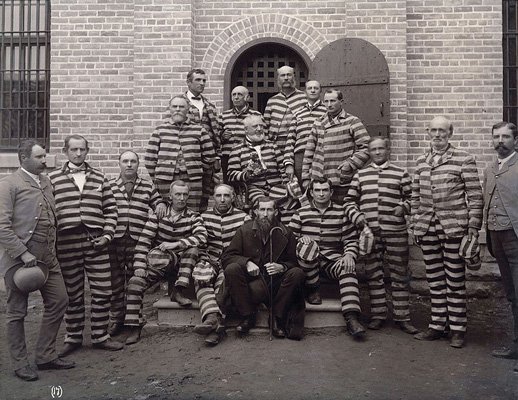Sex Drive: Fantasy Sex Is Where To Find Id

Some people dream of octupuses. See here for a translation of the rather funny Japanese text.
Source: Katsushika Hokusai, The Dream of the Fisherman's Wife w/ Public Domain license, modified.
I'll begin with a spoiler: men's sex fantasy world is massively (or "significantly", to use the statistical term) greater (more populated and more varied and more frequently visited) than women's.
So if we imagine a person's fantasy world like that magical suitcase Newt Scamander carried in the movie Fantastic Beasts and Where to Find Them, populated with all sorts of funny creatures (like that sex octopus up there), then men's suitcases have many more FantasySex Beasts inside them than women's (that would explain why Newt liked to spend so much time inside his suitcase!)
Here's some example numbers: An extensive University of Chicago study found that more than half of the men thought about sex every day or several times a day, compared to less than a fifth of women; another study reported men had 7.2 sexual fantasies a day compared to women's 4.5, and more than half of the men always used sexual fantasy during masturbation compared to slightly more than a fifth of women; yet another study found that men had one sexual fantasy per day compared to one per week for women.[3]
As you can see, the specific numbers differ greatly from study to study, depending on methodology, and even year and location. But the differences in the absolute numbers are not really the point. The differences in the relative numbers of men compared to women is what this post is about.
But before we move on in earnest with the fantasy edition of this sex drive subseries, we need to ask: Why is fantasy a good measure, or even a better measure, of sex drive, compared to, say, actual sex acts?
Thoughts VS Actions

Source: carlos luque w/ CC BY 2.5 license.
When sex researchers measure sex drive, they rarely measure actual sex. Here's one reason why: since it takes two to tango, the results of measuring sex drive in action would be overwhelmingly skewed in favor of "no sex differences".
Plus, if you want numbers (to guard against results being randomly significant), then sex fantasies is your thing — I don't know about you, but I have sex fantasies far more often than I have actual sex. More numbers = better stats.
Plus plus — relating again to the "it takes two to tango" point — sexual acts can often be the result of a compromise, so they may represent the less sex-driven person as more sex-driven (who compromises upwards to satisfy his partner's greater urges), and the more sex-driven person as less sex-driven (who compromises downwards because of his partner's lesser urges), if not altogether mask the possible sex differences.
Plus to the third power, fantasies remove consequential thinking, like "if I do sexual act X, I will end up with a baby which I will have to support", or "if I pursue sexual act Y, I will end up in jail". Much like Gyges' ring (an ancient ring that granted its bearer invisibility, and hence impunity), the removal of consequences reveals more of our true self. Studying fantasies rather than acts therefore probes deeper into our true core.

Sex and consequence.
Source: kalhh w/ CC0 Creative Commons license.
We may also approach this from the other end of the stick. Consider that having lots of sex does not necessarily equal a strong sex drive: it might just indicate a strong money drive! That's probably the case with sex workers. Yes, sex workers might initially go into the field because of a stronger-than-average sex drive; but the specific things they do, and the frequency with which they do them, are probably not reflective of their desires: they probably wouldn't be doing those things if no money was involved. Tabulating their sex acts, then, wouldn't give you an accurate measure of their honest-to-God sex drive.

So this is where KISS got their costume ideas from.
Source: Ralfdix w/ CC BY-SA 3.0 license.
So it seems, for all these reasons and more, that desire proper is the more appropriate thing to study if you want to get an accurate measure of sex drive. It's not surprising, then, that research on the topic of sex drive has centered mostly on our inner world: our sexual fantasies.
A taste of the literature

Consider writing your essays on edible paper. Studies show satiated judges are more lenient.
Source: Kungfuman w/ CC BY-SA 3.0 license.
I could just quote you the one-line summary of a meta-study or two. But that won't give you a real sense of the massive and one-sided sex fantasy sex differences you'd get if you read the papers themselves, in whole.
So to give you a real taste, I decided it would be instructive to collect the fragments of several of the sex differences claims found in just one single paper (part-survey) in one long continuous quote. So here it is:
Men are more likely than women to have sexual fantasies and to be physically aroused by their sexual thoughts [...] American teenage boys are nearly twice as likely as teenage girls to fantasize about sex once a day or more [...] Studies in Japan, the United States, and Great Britain indicate that in each country men have about twice as many sexual fantasies as women do [...] Men are also more likely to have specifically sexual dreams while they sleep [...] Female sexual fantasies are more likely than male fantasies to contain familiar partners and to include descriptions of the context, setting, and feelings associated with the sexual encounter [...] Women are much more likely than men to be only emotionally, rather than physically, aroused by their sexual fantasies [...] women's sexual fantasies have been found to contain more affection and commitment [...] and are more likely to emphasize themes of tenderness and emotionality [...] Women's sexual fantasies are more implicit in sexual content, while men's are more explicit [think softcore VS hardcore, if that helps] [...] Male sexual fantasies specify many more sexual acts, more sexual organs, and a greater variety of sexual content than female sexual fantasies do [...] Male fantasies are more likely to contain visual imagery [...] are much more likely to focus on minute details of the partners' physical appearance [...] and to involve strangers, multiple partners, or anonymous partners [...] Men are more than twice as likely as women to experience sexual fantasies as a result of external stimulation (something encountered in the environment).[1]
I know what you're thinking, and the answer is yes, I did indeed type all that manually because the PDF text was in fact an image. Feel free to express your commiserations in the comment section.
Secondly, wasn't I right? Doesn't that quote paint a more vivid picture than just giving you a one-liner?
I think it does.
And I left one out to treat it individually, because I think it merits it:
Women are more likely to imagine themselves as recipients of sexual activity, while men are more likely to imagine women as recipients of their sexual activity.[1]
I think it's important, because it would seem to imply that women view themselves as objects of sexual desire just as men view them as the objects of their sexual desire. So a woman, in a sense, and surely to the consternation of many a feminist (myself included), objectifies herself. It's like a friend once said to us, a group of four males, while we were downing beers at a bar and philosophizing about women: "man looks; woman is-looked-at" (I tried to approximate the form and succinct brevity of what sounded much better in the Cypriot Greek dialect: "ο άντρας θωρεί, η γυναίκα θωρκέται").
Oddly, fantasies involving being forced or overpowered into a sexual act are fairly common and more equal among men and women compared to all of the above. Women only "probably" have these fantasies more often than men.[1]

A possible sequel to Gerald's Game?
Source: Wiros w/ CC BY-SA 2.0 license.
What role does socialization play in these sex differences?
First, just as in my previous post, let me note that the authors of the long quote too found no differences in the feelings of women and men that accompany and follow their sexual fantasies regarding taboo encounters: men and women were equally likely to experience enjoyment/excitement and guilt/repression from fantasies involving relatives, in-laws, etc.[1]
So socialization has had zero influence there, or the influence was in the direction of reducing sex differences.
Actually, let's just linger on that a bit: why is it always assumed that socialization increases rather than reduces sex differences? In my opinion, the invention of contraceptives alone probably dealt such a devastatingly equalizing blow, that any other attempts to create or maintain sex differences will pale in comparison. Especially in affluent Western societies, sex differences are probably much lesser than they were in a state of nature.
And there's anonymity too. In our times it's so easy to travel to a faraway location and/or use an app to have anonymous sex, that it's hard to pay much credence to the idea of social influences being an effective safeguard against it. Until we put our sex parts on a blockchain, Hell knows how much double-spending is going on!

Chains guarded against doublecrossing, presumably before the invention of fellatio.
Source: Flominator w/ CC BY-SA 3.0 license.
So studying people's sex drive in a world with contraceptives is comparable to studying fantasies instead of sex acts, in the sense that contraceptives have done much to eliminate the consequences of sex (just as consequences are eliminated in fantasy), so surveying people with access to contraceptives might yield far less, and truer, sex differences than surveying people with little or no access to contraceptives. People with no access to contraceptives might, for example, exaggerate sex differences, because it's usually women who bear the brunt of pregnancy and child rearing. With contraceptives, women might behave much more like men.
But people in nature had no access to contraceptives. This means that sex differences today are less; but also, oddly, more unnatural, in that they probably don't reflect how we really functioned in our primordial state. So don't think that removing obstacles gets us closer to "the truth", if by "truth" you mean "our natural state". I even have a pet theory whereby if women's sex drive was "kept in line" so to speak by external factors (like pregnancy or male violence), then the mental-check counterpart needn't have evolved, anymore than you needed to evolve the ability to make your own vitamin B12 when animal game was never far away. I don't know enough to argue for that at the moment, but the point here is that studying a person's mental state outside of the environs in which he evolved carries its own risks.
How can you report what you can't see?

Hard to see without a (glow) stick.
Source: PaulSBarlow w/ CC0 Creative Commons license.
Another argument against the data might go something like this: for women, sexual arousal is less salient — nothing pushes against their pants — and since the fantasy data is based on self-reports, females might under-report their arousals.
First, one could address this data-wise. For instance a study that found almost all the males but only half the females to have experienced sexual desire several times a week or more, has also found that "men and women endorsed essentially the same indicators of desire."[11]
But secondly, and more theory-wise, why does "less salient" immediately invoke the thought "maybe they are under-reporting it"? If it's less salient, they might be over-reporting it! If I'm asked how often I eat strawberries, the question itself might lead this witness to over-estimating my consumption of strawberries, because now they're on my mind, and I'm only remembering the times I eat strawberries, and am failing to take into account, or give proper weight to, the times when I don't eat strawberries. Therefore, salience or no salience, it's best to just take the results we have at face value for now. (Not to mention that it might be somewhat condescending to think women can't know when they're aroused. They know they're aroused at least sometimes, which might undermine the argument altogether.)
Ramifications in everyday life

Polygamists in prison. Women are said to want marriage, but apparently there's a sweet spot where more than one marriage concurrently will land you in prison.
Source: Charles Roscoe Savage w/ Public Domain license.
It doesn't take a sex differences wizard to know that these kinds of differences might lead to conflict in real, lived, life.
I mean, just consider men's vs women's level of agreement with the following statement: "My imagined partner has the power to stir my emotions and excite me physically as no one else can." 75% of females agreed with that statement, vs only 35% of males.[1]
Not conflict-inducing enough for you? Then consider this. Researchers have understandably thought that a person with a stronger sex drive will want to have sex with more people. So they went ahead and asked young males and young females how many sex partners they would ideally like to have over the next N number of years, or over the rest of their lives. In one study, men were hoping (poor things) for an average of 8 partners over the next 2 years; women wanted 1. Over a lifetime, women wanted 2.7 (it's nice to see they don't mind dating handicapable people); men wanted 64.[11]
That's not a typo. It's a 6 followed by a 4.
You don't have to be a mathematician to see that these desires might lead to conflict. As in, women might want to settle, because they already got their 2 in the bag and they're dating number 2.7, whereas men be like "but I got 62 more to go, and I'm already in my late twenties!"
Cue pre-midlife crisis.
For the romantics out there: do not despair! The large difference in the over-a-lifetime study was almost entirely due to a minority of highly promiscuously-inclined men who greatly outnumbered the minority of highly promiscuously-inclined women. The median for both sexes was 1 partner over a lifetime. (Such idealism!) It's still true to say though, if we consider all studies together, that men want to experience sex with more partners overall compared to women, and that's of course fertile ground for conflict.
Curtain close

Still thinking about them strawberries...
Source: Pixabay w/ CC0 license.
Today's post can be summarized thusly:
In brief, male sexual fantasies tend to be more ubiquitous, frequent, visual, specifically sexual, promiscuous, and active. Female sexual fantasies tend to be more contextual, emotive, intimate, and passive.[1]
There are two main points to remember. First, the differences do not appear to be the result of socialization, and exist in all countries ever surveyed.
Second, it's not all just constrained to imagination. Our fantasies spill out into the real world. According to one study, there is "a significant correlation between sexual fantasy and sexual behavior"[3].
And that means conflict. If a skinny person is married to a big person, they can get along as each can cook and eat what he desires. Not so with sex. Sex is shared. It's not easy to go off and do it by yourself without someone getting hurt. The result in many cases might be people being starved or force-fed.
Or, to unpack the metaphor: men might get frustrated sexually, and women might get frustrated emotionally. According, for instance, to some studies, men get more sexually bored in long-term relationships, while women feel greater attraction because of the emotional closeness that develops; when men start a new love affair, their attraction toward other women increases, the opposite of what is true for women.[8]
Even old people are not safe from the ever-prying sex differences researcher! A Duke university study found that older men report a higher chronic sexual arousal when they are not partnered, while women report more sexual needs when they are partnered.[8] And a study of old couples in Sweden found that men wanted sex more often than women.[11] The conclusion of the authors of the Swedish study (now is a good time to recall the stereotype of Sweden as a very sexually egalitarian country) was that "men are significantly more sexual than women, in all ages and in all respects".
In the next post we'll get to the actual sex practices of the two sexes: sex drive in action! Stay tuned.
REFERENCES
Ellis, B. and Symons, D. (1990). Sex differences in sexual fantasy: An evolutionary psychological approach. Journal of Sex Research, [online] 27(4), pp.527-555. Available at: https://doi.org/10.1080/00224499009551579.
Wikipedia contributors. (2018, September 4). Ring of Gyges. In Wikipedia, The Free Encyclopedia. Retrieved 13:07, September 10, 2018, from https://en.wikipedia.org/w/index.php?title=Ring_of_Gyges&oldid=858069822
Geer, J. and Manguno-Mire, G. (1996). Gender Differences in Cognitive Processes in Sexuality. Annual Review of Sex Research, [online] 7(1), pp.90-124. Available at: http://dx.doi.org/10.1080/10532528.1996.10559910 [Accessed 12 Sep. 2018].
Mealey, L. (2000). Sex Differences: Developmental and Evolutionary Strategies. 1st ed. Academic Press. Available online at: https://doi.org/10.1016/B978-0-12-487460-2.X5000-4
Hyde, J. S. (1996). Where are the gender differences? Where are the gender similarities? In D. Buss & N. Malamuth (Eds.), Sex, power, conflict: Evolutionary and feminist perspectives. New York: Oxford Univ. Press. Available online at: http://www.oupcanada.com/catalog/9780195103571.html
Knoth, R., Boyd, K. and Singer, B. (1988). Empirical tests of sexual selection theory: Predictions of sex differences in onset, intensity, and time course of sexual arousal. Journal of Sex Research, [online] 24(1), pp.73-89. Available at: http://dx.doi.org/10.1080/00224498809551399.
Oliver, M. and Hyde, J. (1993). Gender differences in sexuality: A meta-analysis. Psychological Bulletin, [online] 114(1), pp.29-51. Available at: https://www.ncbi.nlm.nih.gov/pubmed/8346327.
Singer, B. (1985). A comparison of evolutionary and environmental theories of erotic response part II: Empirical arenas. The Journal of Sex Research, [online] 21(4), pp.345-374. Available at: https://doi.org/10.1080/00224498509551275.
Udry, J., Billy, J., Morris, N., Groff, T. and Raj, M. (1985). Serum androgenic hormones motivate sexual behavior in adolescent boys. Fertility and Sterility, [online] 43(1), pp.90-94. Available at: https://doi.org/10.1016/S0015-0282(16)48324-X.
Udry, J., Talbert, L. and Morris, N. (1986). Biosocial Foundations for Adolescent Female Sexuality. Demography, [online] 23(2), pp.217-230. Available at: https://doi.org/10.2307/2061617.
Baumeister, R., Catanese, K. and Vohs, K. (2001). Is There a Gender Difference in Strength of Sex Drive? Theoretical Views, Conceptual Distinctions, and a Review of Relevant Evidence. Personality and Social Psychology Review, [online] 5(3), pp.242-273. Available at: https://doi.org/10.1207/S15327957PSPR0503_5.
Lippa, R. (2007). Sex Differences in Sex Drive, Sociosexuality, and Height across 53 Nations: Testing Evolutionary and Social Structural Theories. Archives of Sexual Behavior, [online] 38(5), pp.631-651. Available at: https://doi.org/10.1007/s10508-007-9242-8.
Earlier Sex Differences episodes:
10: Sex Drive: Do Women Have More of Id?
9: The 70-year Cognitive Puzzle That Still Divides The Sexes
8: Do Transsexual Persons Have An Opposite-Sex Brain?
7: Do Parents Stereotype Their Children's Gender?
6: Sex Differences: Do females and males have different brains? Addendum
5: Sex Differences: Do females and males have different brains? Pt 3
4: Sex Differences: Do females and males have different brains? Pt 2
3: Sex Differences: Do females and males have different brains?
2: Sex Differences: Check out the gonads on that one!
1: Sex Differences: Does the Chromosome Maketh the Man?
steemSTEM is the go-to place for science on Steemit. Check it out at @steemstem or browse the #steemSTEM tag or chat live on discord and definitely visit www.steemstem.io
This post has been revived by steem-forever and will get extra rewards. This happens when a post is upvoted on steem-bounty.com after the 7 day post life.
Users can simple upvote via steem-bounty.com continously, so posts can live and earn rewards forever.
Authors can share their steem-bounty.com links and get upvoted forever.
We hope this will allow everyone to earn more meaningful rewards over longer timeframes than before.
Ow Alexander, what a marvelous post. The extent with which you feel comfortable with the English language simply fascinates me! I find it truly impressive.
As for the post itself, well ... I was in tears of (nervous) laughter at the discrepancy between men and women when it comes to how many sexual partners they idealize for themselves in their life time. Oh my God! 😂
Your post delivers so much insight into the conflict couples in long-term relationships face in terms of desire and sexuality, which I have seen over and over again. More and more I see long-term couples' sexual lives as a zero sum game, a dangerous game that can brew much resentment. Something which I assumed would no longer be an issue after a couple reaches a certain age (I must say that I was surprised by the findings from the research that looked into older people).
I can see myself coming back to this later on as it has inspired me greatly to discuss further, here on the platform, the issues these differences can give rise to, and how important it is to address them. I will sure be citing it! :)
Ps: Well done for typing the loong quote from the PDF document! Much, much better than a 'one-liner'. Here, you deserve a star 🌟 😛
You take care ❤
Oh I've a long way till I get to the level of English proficiency I'm aiming at! Don't know if I'll ever get there!
I'm glad the post relates to your work. It's nice to have some meaningful impact and get a meaningful comment in response.
It will be interesting to read a post of yours centered on couples and relationships specifically, since that's not what I do here, I just cite the 'conflict' part to give some lively practical implications of the research and how one can make sense of it in real life, but really the sex differences themselves is the main point, whereas in your work it's 'how do we solve and live with this?', and also real cases of people struggling with this, which will be interesting to read!
I proudly accept the star :D
I wrote a half kilometer comment, pressed "post" and ... it was gone. Simply swallowed in the nirvana of the blockchain. Unfortunately I cannot repeat what I wrote. I was so annoyed that all content went down the drain. Now you get a comment about a lost comment instead. Damn it.
All I can say now are platitudes: Good article. Keep it up. meh.
Maybe it will be smarter after all if I postpone it. But that's how long I feel sorry for myself now.
See you soon, Alexander.
Oh I know that feeling. You got a mini depression now. It's a good tactic to press ctrl + A and then ctrl + C once in a while. Could it get lost cos it was too long? I know there's a post limit now, don't know about a comment limit. ... Pity, cos I'd be interested in reading what you have to say! I thank you anyways! Hopefully you'll gather the strength to repeat some of it eventually!
:) thanx for understanding.
That is a good idea in any way: using "ctrl + A and "ctrl + C". I actually back my text up with a translator but this time all got messed up. Maybe because I was on a holiday trip over the weekend on a German island. lol
If I can make it I will come back to you ... argh ... even thinking about to put all the work in again makes me aching. Though a question you already answered which I had over the course of your series. Which you answered in your reply to @dysfunctional:
You always ask about people's motivations, it's funny! I guess something like "it's inherently interesting" is the most annoying response a person can ever give you!
I don't know if I was aware that Germany has islands. I think of them more in terms of islets. ) Hope you had a good time.
You can save your comments for the next post, since it will be about 'sex drive in action', so it will be similar but also fresh and it will maybe be less frustrating to comment again, and you'll get a 2-week rest!
HaHa, you got to know me quite well over the course of time. That's totally true. And it annoys people back very much so that I sometimes get no answer or a signal that enough questions were asked.
Indeed, the islands are not that big but beautiful. I was getting the best view I ever had, wandering the beach. This one was particularly impressive as one can look from the very far left to the very far right and get a deep sense of the roundness of our planet. I was in awe about the massiveness of the waters and also its calming effect at the same time. We found a good spot behind a dune where we ate and drank excellently.
It's such a good thing to escape the city and to widen the horizon.
Hope, I can find some new questions for your next post ;-)
:D
Shit happens. :)
If there is ever a seminar on how to write a Steemit blog, you and @abigail-dantes have to be headliners. Tireless, meticulous research. Entertaining, attractive presentation. Logical, clear writing. A thorough command of your material.
No wonder it takes a while to get these posts out. The good stuff doesn't come easy, does it?
Yup. You have to actively make it "easy"! I did that by choosing a subject I enjoy reading and learning about, by allocating a set amount of time to research every day and not caring how long it takes till I get a post out. I only publish when I'm satisfied with the material.
Thanks for reading and the good words as always! :)
Hi @alexander.alexis!
Your post was upvoted by Utopian.io in cooperation with @steemstem - supporting knowledge, innovation and technological advancement on the Steem Blockchain.
Contribute to Open Source with utopian.io
Learn how to contribute on our website and join the new open source economy.
Want to chat? Join the Utopian Community on Discord https://discord.gg/h52nFrV
Wow! You did an amazing job here!
At this point, I started laughing out loud :D
Hmm, more than 2 partners, but less than 3. Women never know what they want, don't they :D
I was just thinking "Oh, at least here we are on the same page" when your thoughts about the objectifying of women slapped me in the face. Oh, God, what a feminist I am?!
Jokes aside. I remember an article I read about monogamy and polygamy in birds and mice. It turns out that monogamous birds and mice have more oxytocin receptors than the polygamous.
Actually, humans can differ in the number of oxytocin receptors as well. Moreover, this is one of the explanations of autism occurrence.
So, it may turn out that one must only find their oxytocin match who also wants 2.7 sexual partners :D
😂
Interesting about the oxytocin. About autism, you mean they have more oxytocin receptors too? Or less?
Less, actually. You can check some studies here, here and here.
Maybe you are familiar with this, but simply put, oxytocin is the hormone which attaches humans/animals to each other. It is extremely important during pregnancy, labor and breastfeeding. Actually, it is the hormone which induces labor and makes possible the secretion of mother's milk. Furthermore, it is the hormone which is responsible for maternal behavior.
It secretes during sex and physical touch. It aims to make the couple attached to each other so that they can stay together and raise the next generation.
Basically, this is the hormone of love. And at the same time, it is "a female-thing". It is extremely important to female's behavior. But I haven't researched further if there is any evidence suggesting that females have more oxytocin receptors than males. If this is so, it is a possible explanation of the results of your research.
P.S. I am not a biologist and the way I explain it is perhaps very silly :D
Cheers!
Yes, I thought maybe cos autistic people get obsessed ("attached") with things/behaviors, they might similarly get obsessed over specific individuals, and so have more oxytocin receptors. But there's also the stereotype of them as cold and calculating, like Affleck's The Accountant movie, so it could go either way.
The way you explain it is good! I read Helen Fisher's Why We Love book many years ago and I think that's when I first became familiar with the importance of oxytocin in relationships and attachment. To a great degree, we really are our hormones!
Yes, indeed!
Well done, @alexander.alexis !
I got lured by the title, hoping for some psychoanalytical content, which I think is lacking on this platform :(
I personally think that the results from all that research are kinda trivial and intuitive. Men think more about sex than women. On average women would want less sexual partners but more emotional bounds thank men.. and so on.
Anyway, you did a great write-up and it's obvious that you'd put a lot of work into it.
All the best to you, as always! :)
It's interesting you think it's trivial (i.e. obvious), cos most people think that, and all of them can be divided into 3 groups: people who think that men are obviously more sexual than women, people who think it's obvious that women are more sexual than men, and people who think it's quite obvious that men and women are equally sexual.
:D
Many feminists are now saying women are either equally sexual or more sexual than men. The thing that nudged me into writing for this sex drive topic in the first place was a sex documentary that came out recently (check the beginning of my previous post). And just today I discovered this recently published book: Untrue: Why Nearly Everything We Believe About Women, Lust, and Infidelity Is Wrong and How the New Science Can Set Us Free I got it from this medium article: The Future of Infidelity Is Female
Psychoanalysis has fallen out of favor in scientific circles. But for me Freud is up there with the best of psychologists!
Thanks for reading )
I realize that since such studies exist, there have to be an argument about the topic.
Meh... Feminists, flat-earthers.. I will not comment on such individuals beliefs.
Thanks for the read :)
To be fair, the handicapable are known to be dynamite in bed :P
Well this was a long and informative read. Not gonna lie, I got interested after you started citing some resources from researches. Not a fan of opinion posts. I get to learn something unusual from the daily topics I face today. They never taught this is school and it's really an important aspect in relationships to consider. Well done for this post :D
Yeah my posts tend to be on the long side. Next's one's gonna be even longer!
Glad you liked the post.
Fantastic post, sir!
Having been in an around the sex industry for 2 decades (my then girlfriend introduced me to it, the corruptor!lol), I would disagree witht he the premise 'if no money was invovled'.
From the circles I knew of (films and escorting mostly), it was an extension of their tastes, and not a compromise, (many many times, but not always).
It's interesting what you say about 'romantics'...
While I think this is true, I don't think it has to fertile ground for conflicts - if you are in an emotionally mature relationship.
I'm not the stereotypical male to really compare of course, but I'm a romantic, and I'm definitely a 'one woman one man' type of guy - but equally the male sex drive doesn't go away, and to satisfy both parts it quite easy - if you are strong enough to be honest (which I am, annoyingly. lol.)
I let it be known that 'my heart is their's' , but my cock is my own!
While sounding shallow, it's actually not. I can't imagine lying to my partner, and I can't imagine not have sex with whoever I feel like.
True , it leads to some very short lived relationships, because of insecurities, but equally the long term relationships I've had, have been very mature, becuase they know who I am, and I'm being me.
(how can you be in relationship, and not want your partner to be themselves? Weird.)
They also know I'm not looking to place my heart anywhere else, I'm very emotionally monogamous.
'Sexual playtime', is just games for adults... but many people cannot grasp that concept or do not believe their partners words...
Great post, again!
definitely followed -
Interesting input since you're part of the industry! But that's the high class part of the industry, I think, the way you described it. But, still, if the sex researcher asks questions like 'how many people have you had sex with in the last month?', imagine the difference between people who do it for a living (for money), and the same person if he did it only naturally.
I totally identify with this part! I'm ambivalent about the part that follows. I consider it a big problem in our societies. I don't know how it'll be solved. Clearly polygamy has been tried and failed. Monogamy also doesn't work given all the cheating and divorce rates. So I don't know what that leaves us with! Perhaps in the future we'll just be having sex in a virtual reality that feels very real, with virtual entities...!
I often say something similar in reverse: how can you be in a relationship and not be 100% honest with your partner? Whatever "love" you gain will be a love directed toward an imaginary person, not you. So I don't know what pretenders think they're gaining from this.
Well this has ethical issues, I think, besides trust. (Regarding trust, do you extend the same rights to your partner?) The ethical issues are whether it's okay to just have sex with someone in order to get rid of some purely animal urges, while not caring about these people emotionally at all, and being 100% emotionally devoted to your partner. I can imagine you placating your partner's concerns, for instance, by saying things like "Honey, she meant nothing to me, you know that. Just a cum-bucket, Melinda was for me. Oh, it's Cecilia? See, I don't even remember her name! She could get killed in a car accident tomorrow and it wouldn't make my emotional world an emptier place for all I know."
I'm exaggerating, but you get the point!
Very happy to have you as a follower! I'll check your blog tmr since I fulfilled my steemit quota for today! D